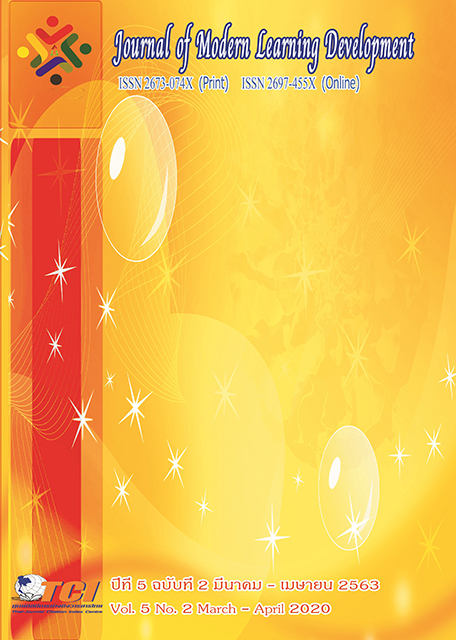The Model of Leader Development in Accordance with Buddhism in Amnat Charoen Province
Main Article Content
Abstract
The aims of this research were: 1) to study concepts and problems of leadership of community leaders in the current Thai society; 2) to study the dhammaprinciples relating to the development of leaders in Buddhism; 3) to propose a leadership development model based on Buddhism in Amnat Charoen Province. The study was carried out by means of a qualitative research methodology. The key informants used in the study were 30 community leaders in Sang NokTha Sub-district and Lao Pruan Sub-district. The data were collected by using in-depth interviews. The development of community leaders was analyzed and presented by the descriptive analysis.
The results of the research showed that: community leaders in Sang NokTha Sub-district Administrative Organization and Lao Pruan Sub-district Administrative Organization have a passion for drinking and beer until causing a poor work performance because of a lack of consciousness in making decisions on various matters, elegance and bravery as the corporate leaders. The leaders without money to buy goods (water and food) needed in the family spend money according to the current world needs until having a negative impact on daily life. The leaders lack of awareness of work performance based on their roles and responsibilities assigned by the people. This results in a feeling of insult to the people.Leaders use the power to encroach and conceal the money and land of the villagers as their own and hide government official information and does not encourage people to have access to legitimate rights.
There are four principles of Buddhist Dhamma used in the development of leaders: Satisampajañña (Consciousness) which is supportive in small and large business or in doing all good deeds, namely, being a principle enable people to have clear awareness, therefore called ‘Bahukāra-dhamma (Virtues of Great Assistance)’; Uṭṭhānasampadā (Achievement of Persistent Effort) meaning ‘to be ready with diligence with wisdom’ in right occupation, learning and business to get a good results; Attaññutā (Self-Knowledge) meaning ‘to know oneself’ such one’s own knowledge, aptitude, virtue, ability, status and appropriate acting for good results; Avihiṁsā (inoffensiveness) meaning ‘invasiveness, no-oppression, not thinking of making trouble for others, thinking only to help people from suffering’.
After the Buddhist doctrine to the said leaders' development is applied, it results in the development of four aspects: 1) leaders gain consciousness and awareness (Satisampajañña) in drinking, consumption and performance of duties; 2) leaders have to save money for the purchase of various appliances used in everyday life and live life to not be in line with the trend of the modern world society, i.e. knowing the restraint of buying; 3) leaders recognize themselves, know their roles and responsibilities in work focusing on servicing and managing citizens; 4) leaders do not encroach, harass, and hurt people in their own territoryand Let peopleto access to the true information of the government, to promote basic rights to all, thoroughly and fairly and to create a culture of good service to all people in all genders and all professions.
Article Details
References
นันทวรรณ อิสรนุวัฒน์ชัย. (2550). ภาวะผู้นำที่พึ่งประสงค์ในยุคโลกาภิวัตน์: ศึกษาจากหลักพุทธธรรม. วิทยานิพนธ์พุทธศาสตรมหาบัณฑิต. บัณฑิตวิทยาลัย: มหาวิทยาลัยมหาจุฬาลงกรณราชวิทยาลัย.
ประเวศ วะสี. (2539). ยุทธศาสตร์ทางปัญญาของชาติ ยุทธศาสตร์ที่สำคัญที่สุดของสังคมทั้งหมดร่วมกัน. (พิมพ์ครั้งที่ 4). กรุงเทพมหานคร: บริษัท อมรินทร์ พริ้นติ้งแอนด์พัลิเคชั่น จำกัด มหาชาน.
พระมหาคมเพชร วชิรปญฺโญ. (2552). การนำหลักสัปปุริสธรรม 7 มาประยุกต์ใช้ในการบริหารราชการ ส่วนท้องถิ่น : กรณีศึกษาเฉพาะองค์การบริหารส่วนตำบลในอำเภอบางบัวทอง จังหวัดนนทบุรี. วิทยานิพนธ์พุทธศาสตรมหาบัณฑิต. บัณฑิตวิทยาลัย : มหาวิทยาลัยมหาจุฬาลงกรณราชวิทยาลัย.
พัชรา วิณิชวศิน. (2561). การพัฒนาภาวะผู้นำ: จากทฤษฎีสู่แนวปฏิบัติที่ดีและกรณีศึกษา. กรุงเทพมหานคร: บริษัท ปัญญาชน ดิสทริบิวเตอร์ จำกัด.
วิเชียร วิทยอุดม. (2548). ภาวะผู้นำ. กรุงเทพมหานคร: โรงพิมพ์ธีระฟิล์มและไซเท็กซ์.
สุรศักดิ์ ม่วงทอง. (2543). พุทธธรรมกับภาวะผู้นำพึงประสงค์. วิทยานิพนธ์อักษรศาสตรมหาบัณฑิต. บัณฑิตวิทยาลัย: มหาวิทยาลัยมหิดล.


